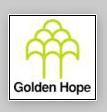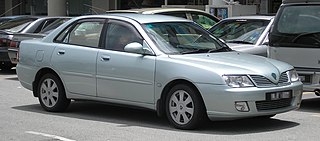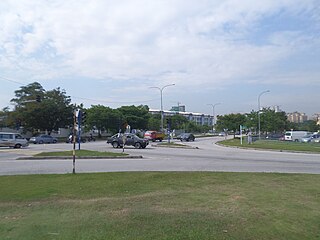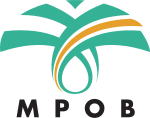
Palm oil is an edible vegetable oil derived from the mesocarp of the fruit of the oil palms. The oil is used in food manufacturing, in beauty products, and as biofuel. Palm oil accounted for about 33% of global oils produced from oil crops in 2014. Palm oils are easier to stabilize and maintain quality of flavor and consistency in processed foods, so are frequently favored by food manufacturers. On average globally, humans consumed 7.7 kg (17 lb) of palm oil per person in 2015. Demand has also increased for other uses, such as cosmetics and biofuels, creating more demand on the supply encouraging the growth of palm oil plantations in tropical countries.
Palm kernel oil is an edible plant oil derived from the kernel of the oil palm tree Elaeis guineensis. It is related to other two edible oils: palm oil, extracted from the fruit pulp of the oil palm, and coconut oil, extracted from the kernel of the coconut.

Sime Darby Berhad is a Malaysian trading conglomerate. Its core businesses operate and serve in the industrial, motors and logistics sectors as well as the healthcare, and insurance segments.

Golden Hope Plantations Berhad (GHPB) was an estate and plantations company in Malaysia.

This article lists important figures and events in Malaysian public affairs during the year 2000, together with births and deaths of notable Malaysians.

Bukit Raja can be referred a mukim in Petaling District, Selangor, Malaysia, that contains several areas in northern Shah Alam which are western part of Section 7 of Shah Alam, Setia Alam (U13), Denai Alam, Bukit Subang, Alam Budiman, Puncak Perdana, Bukit Bandaraya (U11) and National Botanic Gardens Shah Alam. However, definition of Bukit Raja nowadays has shifted south away, which commonly refer to several areas in Klang, that consists of some former oil palm plantation owned by Sime Derby Plantations. The first development of Bukit Raja estate was an industrial area around Bandar Baru Klang and Federal Highway, subsequently Bukit Raja has expanded to the border of Setia Alam with new establishment of “Bandar Bukit Raja” housing project.
Balachandra Chakkingal Sekhar modernised Malaysia's natural rubber industry. It was claimed that he was known as Mr Natural Rubber. He was also involved in the development of the nation's palm oil industry. Sekhar was of ethnic Indian origin.
Palm oil, produced from the oil palm, is a basic source of income for many farmers in South East Asia, Central and West Africa, and Central America. It is locally used as cooking oil, exported for use in much commercial food and personal care products and is converted into biofuel. It produces up to 10 times more oil per unit area than soybeans, rapeseed or sunflowers.

The Roundtable on Sustainable Palm Oil (RSPO) was established in 2004 with the objective of promoting the growth and use of sustainable palm oil products through global standards and multistakeholder governance. The seat of the association is in Zurich, Switzerland, while the secretariat is currently based in Kuala Lumpur, with a satellite office in Jakarta. RSPO currently has 4,706 members from 94 countries.
Elmina Estate is an oil palm plantation in Petaling District, Selangor, Malaysia. It is currently owned and operated by Sime Darby Berhad.

The Ministry of Plantation and Commodities is a ministry of the Government of Malaysia that is responsible for overseeing the development of the main commodities of Malaysia which are palm oil, rubber, timber, furniture, cocoa, pepper, kenaf and tobacco.

Elaeis guineensis is a species of palm commonly just called oil palm but also sometimes African oil palm or macaw-fat. It is the principal source of palm oil. It is native to west and southwest Africa, specifically the area between Angola and the Gambia; the species name, guineensis, refers to the name for the area, Guinea, and not the modern country now bearing that name. The species is also now naturalised in Madagascar, Sri Lanka, Malaysia, Indonesia, Central America, Cambodia, the West Indies, and several islands in the Indian and Pacific Oceans. The closely related American oil palm Elaeis oleifera and a more distantly related palm, Attalea maripa, are also used to produce palm oil.

Palm oil production is vital for the economy of Malaysia, which is the world's second- largest producer of the commodity after Indonesia. The Malaysian Palm Oil Board (MPOB) is a government agency responsible for the promotion and development of the palm oil sector in the country. The country's palm oil industry produces about 90 million tonnes of lignocellulosic biomass, including empty fruit bunches, oil palm trunks, and oil palm fronds, as well as palm oil mill effluent (POME). In 2010, in response to concerns about social and environmental impact of palm oil, the Malaysian Government pledged to limit palm oil plantation expansion by retaining at least half of the nation's land as forest cover.

Musim Mas operates globally across the palm oil business spectrum with an operational presence in 13 countries across Asia-Pacific, Europe, North and South America. The group owns one of the largest palm oil refinery networks in the world, operating in the vegetable oil refining business. It also manufactures consumer goods in Indonesia, producing soap and cooking oil brands. Musim Mas has a 37,000-strong workforce, supported by a comprehensive logistical network of chemical and costal tankers, barges, tugboats and bulk installations at major ports across Indonesia and other strategic parts of the world.
Tan Sri Datuk Dr. Yusof Basiron is a scientist and an influential public figure in the Malaysian palm oil industry. He was the CEO of the Malaysian Palm Oil Council (MPOC), and a non-independent non-executive director on the board of Sime Darby.
Sarawak Land Development Board (SLDB) was a Malaysian body corporate active in palm oil industry and other industries founded in 1972.
TH Plantations Berhad is a Malaysian palm oil company. It was established in 1972. It has major activity in Indonesia. Its chairman is Yusof Basiran. There was fire on its land in 2013. It is owned at 73.83% by the government-run Tabung Haji (2016). A notable director is Dato' Noordin bin Md Noor, who has long-standing activity in politics.
Emery Oleochemicals is a global oleochemical company. Emery operates production plants in the United States, Germany and Malaysia. Its products serve a wide range of industries, including agriculture, heavy industry and consumer products. The company is a 50:50 joint venture between PTT Global Chemical of Thailand and Sime Darby Plantation of Malaysia.
Nucleus estate and smallholder (NES) is a farming system for commodity crops, often oil palm, practised in different world regions. It is most famous today for its application in the palm oil sector in Indonesia. The nucleus is the part of such a plantation that is under concession and management of the company, while another part of the plantation is operated by smallholders typically on their own land but planted by the company. NES farming is a particular form of contract farming.

The Council of Palm Oil Producing Countries (CPOPC) is an intergovernmental organization founded by Indonesia and Malaysia to collectively promote the global use of palm oil. Together, the two countries produce the majority of the world's palm oil, a product that has come under pressure due to environmental concerns. The CPOPC was founded in 2015 following the establishment of independent palm oil sustainability standards in both countries, and part of its purpose is to harmonize sustainability standards between the two.











